#and Public Transit and Utilities and--
Explore tagged Tumblr posts
Text
when i tell y'all i can get myself absolutely lost in the weeds over the dumbest things
#currently overthinking the Movement Of Goods in the paldea region#and Public Transit and Utilities and--#pokemon: here's a cool new region to check out and a bunch of new pokemon and characters to meet!#me: cool but Where is the waste water treatment plant?? &how are they moving goods between cities if there are no pavement roads-#this scarlet|violet fic is literally going to take me 10 years to write at this rate klfghfkjd#it still doesn't even have a fucking tITLE#writing tag
5 notes
·
View notes
Text
Hi !
I got bottom surgery on July 25th :3
I'm recovering well but I'll be on bedrest for a while. Collie and I will need rent help for September/food/gas/utilities/etc. Two disabled trans women. Anything helps ! Thank yall so much for all you've helped so far, it's saved my life ❤️
https://venmo.com/u/nora-esther-rose
https://www.paypal.me/NoraEstherRose
https://venmo.com/u/Leah-Esther-Rose
https://www.paypal.me/androgynophore
#leah is still her legal name#her mom helps w us having a phone at all and can sometimes help but never a full months rent help so thats def the most pressing matter#but we already paid august rent and we have a month so we'll probably be fine#actually still havent paid utilities :/#i was wondering if more donations would happen since the surgery date and apparently not#got three the day of and two the day before but we're at 70 rn after all the gas of dropping me off and visiting twice or smth.#idk. stupid van. she should be taking public transit but i get why she doesnt want to. barely anyone masks on public transit here anymore :/#edit update: collies mom helped us pay utilities for last month which was mostly the electricity bill. water bill comes every 3 months#so i guess we'll see how much that is.
2K notes
·
View notes
Text
I know my experience is not universal, but I biked 5+ miles to do my errands today and I genuinely think we'd be much happier as a human collective if we increased residential density and switched to largely alternative modes of transportation.
#I don't know /how/ you'd do it exactly but this is my vision:#all cars are kept outside a certain perimeter. you can own a car and rent your outside-the-city parking spot;#or you can just reserve/rent a communally owned car when you need one#trucks and deliveries can cross the perimeter on a job but after the work is finished they must be returned to the exterior#inside the city perimeter you can: walk or run; bike or scooter or skateboard#or you can take public transit! there are many more buses and they can move much more freely in a car-less environment#there is also the option of cabs but - and this is key - the cabbies are unionized and the service is public#like the trains and buses.#there is no privately-controlled transit in the city. it belongs to everyone.#and because the lines of parked cars disappear from the streets; they are much better utilized#more kids play in the street. more block parties. more street fairs.#take back the space!!!#anyway this is my vision.#celestial emporium of benevolent knowledge
312 notes
·
View notes
Note
Kind of impressive that you talk about katara as though you're defending her from racist and misogynistic interpretations and then turn around and imply shit 100x worse than your most exaggerated strawman.
Go bug your mom
#does your mind come with free wifi on top of free rent?#how many beds/baths?#are ALL utilities covered or just gas?#and is it close to public transit?#as long as I'm living rent free in your brain i may as well make the most of it#just sayin🤷🏾♀️
30 notes
·
View notes
Text
"Its actually a crime for a municipality to build a light-rail in the state of Indiana" sounds like a line from an episode of Parks and Recreation where they might try to improve Pawnee's public transit, not an actual true fact
#IN Code § 8-25-4-9 (2022) for anybody interested#transit#indiana#parks and rec#light rail#weird laws#side note my favorite legal phrasing is from Indiana code 8-1-2-4 which requires public utilities to be and I quote 'reasonably adequate'
2 notes
·
View notes
Text
Out of curiosity I looked up rankings of rail providers in Europe. While UK providers are known for being expensive they don't appear on T&E's rankings of the worst rail providers. Moreover Sweden's Snälltåget received a score of 0/10 in the reliability category. Are UK trains really the least reliable in Europe or is OP just complaining about train service (something people everywhere love to do)?

#privatized services are not always worse#It depends heavily on the quality of management#Very bad public sector management?#worse service than middling private sector management#Exceptional public sector management?#probably better than private management#Anyway#Singapore has excellent privatized rail#and telecoms#that were formerly nationalized#(and very well managed as public utilities)#I'm sure part of their success is their transit authority that I believe is public
53K notes
·
View notes
Text
Playing Games with Politics
New poem! I might revisit this one later. It doesn't quite feel finished yet.
They don’t like the rules….So they changed the game.We were playing chessWhile they were playing monopoly.They sold off the utilitiesAnd defunded public transitThey tore down the housesand replaced them with hotels.

View On WordPress
0 notes
Text
🗝
#sometimes i really forget that i live in a city#like the city didn't start as one and it just got bigger and bigger and became a city#cause it looks like every [town] but its just big#but i think since utilizing the one public transit we have [buses] that has helped me to realize it i guess#idk just early morning thoughts from the bus lol
1 note
·
View note
Text

HELP A DISABLED QUEER DUDE GET OUT OF HIS LIVING SITUATION
hi! i'm plum- a lot of you probably know me as cosmo though! i've been planning to move out with some long-time friends for just over a year now, but the date has been repeatedly pushed back for a few family reasons, among other things.
my mother, who i am dependent upon for transportation until i move, has stated that next month she is going to be charging me for basic essentials as a "trial run" for existing in the "real world," conveniently one month before i was set to move out in june. i already pay a share of rent and utilities, but now she is going to start charging me for food and transportation- telling me that i'll need to uber to the bank to get cash in order to pay for the state-sponsored public transit system i qualify for through my psychiatric care. it's been hard for me to save for numerous reasons, and just as i've been able to finally get money in my account, our food insecurity and the new restrictions mom is putting on me are going to result in me being stuck here for even longer. she's been manipulative and asserted that i shouldn't move out for a while, constantly moving the goalposts and doing things to sabotage me, and while i have my own hangups about calling her an abusive person, this is just textbook financial abuse. i cannot live in this household anymore, and i'm sick of being manipulated and strongarmed into staying in a housing situation that isn't good for me.
once i'm living with my friends, i'll have a financial cushion and space to be able to get a job to help pay my share in addition to my social security benefits, but right now, i need help. i need to rapidly accumulate as much savings as i can to cover things like my phone bill, any changes i'll need to make to my ID, and a bit extra to help cover my share of groceries while i wrangle the SSA into getting my new address (and a new bank account) on file. i don't have a solid goal other than a vague "over one hundred dollars", so anything helps me here, no matter how small.
thank you for taking the time to read, and please reblog if you can!!
MOVED OUT AND HAPPY NOW!! DISABLING RBS, TYSM!
278 notes
·
View notes
Text
"New York is marking the early achievement of its Climate Leadership and Community Protection Act statutory goal a year ahead of schedule, announcing that 6 gigawatts (GW) of distributed solar have been installed across the state, enough to power more than one million homes.
New York State Energy Research and Development Authority (NYSERDA) president and CEO Doreen M. Harris broke the news onsite at a distributed solar project in New Scotland, NY today. The project, developed by New Leaf Energy and owned by Generate Capital, participates in the state’s Solar for All pilot program with utility partner National Grid, meaning its generation benefits low-income households. The site’s 5.7 MW solar array will generate 6.7 million kilowatt-hours of solar energy annually, powering about one thousand homes.
“New York State has provided a replicable model for others to deliver clean, low-cost renewable energy to more consumers,” asserted Harris. “Our public-private partnerships are the catalysts which have helped us to achieve our 6-GW goal well ahead of target, trailblazing New York’s path to an equitable energy transition.”
Governor Kathy Hochul says this achievement brings New York one step closer to a reliable, resilient, zero-emission grid. The Climate Leadership and Community Protection Act contains goals to generate 70% of the state’s electricity from renewable sources by 2030 and 100% zero-emission electricity by 2040.
“Distributed solar is at the heart of reducing greenhouse gas emissions, expanding the availability of renewable energy, and delivering substantial benefits for our health, our environment, and our economy,” Hochul added.
New York achieving its distributed solar goal of 6 GW has generated approximately $9.2 billion in private investment across the state, according to NYSERDA, creating more than 14,000 solar jobs from engineering to installation. Three years ago, Governor Hochul directed to expand the goal to 10 GW by 2030.
“While we’re incredibly proud of the work and partnerships that have led to this achievement, we’re more excited that it can be repeated and multiplied. With the State’s continued leadership, we’re confident we can get to 10 GW and beyond,” predicts New Leaf Energy director of policy and business development Sam Jasinsk.
The state says it has another 3.4 GW of distributed solar projects already in development, making a 10 GW goal quite feasible.
“Customers and consumers are asking for access to clean energy, and New York state is listening,” Generate Capital Investments managing director Peggy Flannery said. Generate Capital operates 69 projects and counting in New York.
In 2023, New York installed more community solar capacity than any other state. Last year was also the state’s most productive year ever for solar installations, with 885 MW of capacity installed.
In April, NYSERDA was selected to receive nearly $250 million from the United States Environmental Protection Agency (EPA) Solar for All program to enhance New York State’s existing portfolio of solar deployment, technical assistance, and workforce development programs for the benefit of over 6.8 million residents that live in low-income households and disadvantaged communities. As part of the grant funding, the New York State Housing and Community Renewal, the New York City Department of Environmental Protection, and New York City Housing Preservation and Development, will implement new programs that target specific barriers to solar deployment for this population."
-via Renewable Energy World, October 17, 2024
#new york#ny#nyc#solar#solar power#distributed solar#community solar#united states#north american#clean energy#climate action#climate hope#good news#hope
354 notes
·
View notes
Text
Like it or not, you’re in a relationship with anything that takes up your time, thoughts, and energy— and that includes money. In fact, the two longest relationships you’ll have are with yourself and with money. Both of these relationships affect how you live & your relationship with money doesn’t have to be stressful.
Think about how you feel about money. Do you see it as hard to get or something that flows easily to you What do you want your money to do for you? Save for a trip? Buy a home? Setting specific goals gives you direction.
A budget is just a plan for your money. It helps you see where it’s going and where you can make better choices. Focus on what you already have instead of what you don’t. Gratitude can help you feel more abundant.
Create a budget and write down all of your expenses. Most people don’t know where their money goes because they dont take into account their pleasure purchases. Put some money aside for yourself before paying for other things. It’s a simple way to build up your savings. If you have debt, make a plan to pay it off. Start with the high interest ones first.
Don’t fear money. See it as a tool that can come and go. Believe that you can always create more. Share what you can, even if it’s a small amount. It helps you feel more connected to abundance. The more you complain about not having, the less you will continue to have. You have to learn how to think abundantly.
You can downloads any of these apps:
Mint
YNAB (You Need a Budget)
PocketGuard
Goodbudget
Undebt.it
Honeydue
Personal Capital
EveryDollar
———————————
Alternatively, here’s a templare you can copy and paste:
1. Income
• Primary Income: $_________
• Side Income: $_________
• Other Income (e.g., investments, bonuses): $_________
Total Income: $_________
2. Fixed Expenses
(Expenses that stay the same each month)
• Rent/Mortgage: $_________
• Utilities (Electricity, Water, Gas): $_________
• Internet/Phone: $_________
• Insurance (Health, Car, Home): $_________
• Debt Payments (Loans, Credit Cards): $_________
• Subscriptions (Streaming, Gym, etc.): $_________
Total Fixed Expenses: $_________
3. Variable Expenses
(Expenses that can change each month)
• Groceries: $_________
• Transportation (Gas, Public Transit, etc.): $_________
• Eating Out/Entertainment: $_________
• Shopping (Clothes, Household Items): $_________
• Personal Care (Skincare, Haircuts): $_________
• Miscellaneous: $_________
Total Variable Expenses: $_________
4. Savings and Investments
• Emergency Fund: $_________
• Retirement (401k, IRA, etc.): $_________
• Investments: $_________
• Specific Savings Goals (Travel, Home, etc.): $_________
Total Savings/Investments: $_________
5. Giving
(Donations, gifts, tithing, etc.)
• Charities/Donations: $_________
• Gifts: $_________
Total Giving: $_________
6. Summary
• Total Income: $_________
• Total Expenses (Fixed + Variable): $_________
• Total Savings/Investments: $_________
• Remaining Balance: $_________
202 notes
·
View notes
Text
Cleantech has an enshittification problem

On July 14, I'm giving the closing keynote for the fifteenth HACKERS ON PLANET EARTH, in QUEENS, NY. Happy Bastille Day! On July 20, I'm appearing in CHICAGO at Exile in Bookville.

EVs won't save the planet. Ultimately, the material bill for billions of individual vehicles and the unavoidable geometry of more cars-more traffic-more roads-greater distances-more cars dictate that the future of our cities and planet requires public transit – lots of it.
But no matter how much public transit we install, there's always going to be some personal vehicles on the road, and not just bikes, ebikes and scooters. Between deliveries, accessibility, and stubbornly low-density regions, there's going to be a lot of cars, vans and trucks on the road for the foreseeable future, and these should be electric.
Beyond that irreducible minimum of personal vehicles, there's the fact that individuals can't install their own public transit system; in places that lack the political will or means to create working transit, EVs are a way for people to significantly reduce their personal emissions.
In policy circles, EV adoption is treated as a logistical and financial issue, so governments have focused on making EVs affordable and increasing the density of charging stations. As an EV owner, I can affirm that affordability and logistics were important concerns when we were shopping for a car.
But there's a third EV problem that is almost entirely off policy radar: enshittification.
An EV is a rolling computer in a fancy case with a squishy person inside of it. While this can sound scary, there are lots of cool implications for this. For example, your EV could download your local power company's tariff schedule and preferentially charge itself when the rates are lowest; they could also coordinate with the utility to reduce charging when loads are peaking. You can start them with your phone. Your repair technician can run extensive remote diagnostics on them and help you solve many problems from the road. New features can be delivered over the air.
That's just for starters, but there's so much more in the future. After all, the signal virtue of a digital computer is its flexibility. The only computer we know how to make is the Turing complete, universal, Von Neumann machine, which can run every valid program. If a feature is computationally tractable – from automated parallel parking to advanced collision prevention – it can run on a car.
The problem is that this digital flexibility presents a moral hazard to EV manufacturers. EVs are designed to make any kind of unauthorized, owner-selected modification into an IP rights violation ("IP" in this case is "any law that lets me control the conduct of my customers or competitors"):
https://locusmag.com/2020/09/cory-doctorow-ip/
EVs are also designed so that the manufacturer can unilaterally exert control over them or alter their operation. EVs – even more than conventional vehicles – are designed to be remotely killswitched in order to help manufacturers and dealers pressure people into paying their car notes on time:
https://pluralistic.net/2023/07/24/rent-to-pwn/#kitt-is-a-demon
Manufacturers can reach into your car and change how much of your battery you can access:
https://pluralistic.net/2023/07/28/edison-not-tesla/#demon-haunted-world
They can lock your car and have it send its location to a repo man, then greet him by blinking its lights, honking its horn, and pulling out of its parking space:
https://tiremeetsroad.com/2021/03/18/tesla-allegedly-remotely-unlocks-model-3-owners-car-uses-smart-summon-to-help-repo-agent/
And of course, they can detect when you've asked independent mechanic to service your car and then punish you by degrading its functionality:
https://www.repairerdrivennews.com/2024/06/26/two-of-eight-claims-in-tesla-anti-trust-lawsuit-will-move-forward/
This is "twiddling" – unilaterally and irreversibly altering the functionality of a product or service, secure in the knowledge that IP law will prevent anyone from twiddling back by restoring the gadget to a preferred configuration:
https://pluralistic.net/2023/02/19/twiddler/
The thing is, for an EV, twiddling is the best case scenario. As bad as it is for the company that made your EV to change how it works whenever they feel like picking your pocket, that's infinitely preferable to the manufacturer going bankrupt and bricking your car.
That's what just happened to owners of Fisker EVs, cars that cost $40-70k. Cars are long-term purchases. An EV should last 12-20 years, or even longer if you pay to swap the battery pack. Fisker was founded in 2016 and shipped its first Ocean SUV in 2023. The company is now bankrupt:
https://insideevs.com/news/723669/fisker-inc-bankruptcy-chapter-11-official/
Fisker called its vehicles "software-based cars" and they weren't kidding. Without continuous software updates and server access, those Fisker Ocean SUVs are turning into bricks. What's more, the company designed the car from the ground up to make any kind of independent service and support into a felony, by wrapping the whole thing in overlapping layers of IP. That means that no one can step in with a module that jailbreaks the Fisker and drops in an alternative firmware that will keep the fleet rolling.
This is the third EV risk – not just finance, not just charger infrastructure, but the possibility that any whizzy, cool new EV company will go bust and brick your $70k cleantech investment, irreversibly transforming your car into 5,500 lb worth of e-waste.
This confers a huge advantage onto the big automakers like VW, Kia, Ford, etc. Tesla gets a pass, too, because it achieved critical mass before people started to wise up to the risk of twiddling and bricking. If you're making a serious investment in a product you expect to use for 20 years, are you really gonna buy it from a two-year old startup with six months' capital in the bank?
The incumbency advantage here means that the big automakers won't have any reason to sink a lot of money into R&D, because they won't have to worry about hungry startups with cool new ideas eating their lunches. They can maintain the cozy cartel that has seen cars stagnate for decades, with the majority of "innovation" taking the form of shitty, extractive and ill-starred ideas like touchscreen controls and an accelerator pedal that you have to rent by the month:
https://www.theverge.com/2022/11/23/23474969/mercedes-car-subscription-faster-acceleration-feature-price
Put that way, it's clear that this isn't an EV problem, it's a cleantech problem. Cleantech has all the problems of EVs: it requires a large capital expenditure, it will be "smart," and it is expected to last for decades. That's rooftop solar, heat-pumps, smart thermostat sensor arrays, and home storage batteries.
And just as with EVs, policymakers have focused on infrastructure and affordability without paying any attention to the enshittification risks. Your rooftop solar will likely be controlled via a Solaredge box – a terrible technology that stops working if it can't reach the internet for a protracted period (that's right, your home solar stops working if the grid fails!).
I found this out the hard way during the covid lockdowns, when Solaredge terminated its 3G cellular contract and notified me that I would have to replace the modem in my system or it would stop working. This was at the height of the supply-chain crisis and there was a long waiting list for any replacement modems, with wifi cards (that used your home internet rather than a cellular connection) completely sold out for most of a year.
There are good reasons to connect rooftop solar arrays to the internet – it's not just so that Solaredge can enshittify my service. Solar arrays that coordinate with the grid can make it much easier and safer to manage a grid that was designed for centralized power production and is being retrofitted for distributed generation, one roof at a time.
But when the imperatives of extraction and efficiency go to war, extraction always wins. After all, the Solaredge system is already in place and solar installers are largely ignorant of, and indifferent to, the reasons that a homeowner might want to directly control and monitor their system via local controls that don't roundtrip through the cloud.
Somewhere in the hindbrain of any prospective solar purchaser is the experience with bricked and enshittified "smart" gadgets, and the knowledge that anything they buy from a cool startup with lots of great ideas for improving production, monitoring, and/or costs poses the risk of having your 20 year investment bricked after just a few years – and, thanks to the extractive imperative, no one will be able to step in and restore your ex-solar array to good working order.
I make the majority of my living from books, which means that my pay is very "lumpy" – I get large sums when I publish a book and very little in between. For many years, I've used these payments to make big purchases, rather than financing them over long periods where I can't predict my income. We've used my book payments to put in solar, then an induction stove, then a battery. We used one to buy out the lease on our EV. And just a month ago, we used the money from my upcoming Enshittification book to put in a heat pump (with enough left over to pay for a pair of long-overdue cataract surgeries, scheduled for the fall).
When we started shopping for heat pumps, it was clear that this was a very exciting sector. First of all, heat pumps are kind of magic, so efficient and effective it's almost surreal. But beyond the basic tech – which has been around since the late 1940s – there is a vast ferment of cool digital features coming from exciting and innovative startups.
By nature, I'm the kid of person who likes these digital features. I started out as a computer programmer, and while I haven't written production code since the previous millennium, I've been in and around the tech industry for my whole adult life. But when it came time to buy a heat-pump – an investment that I expected to last for 20 years or more – there was no way I was going to buy one of these cool new digitally enhanced pumps, no matter how much the reviewers loved them. Sure, they'd work well, but it's precisely because I'm so knowledgeable about high tech that I could see that they would fail very, very badly.
You may think EVs are bullshit, and they are – though there will always be room for some personal vehicles, and it's better for people in transit deserts to drive EVs than gas-guzzlers. You may think rooftop solar is a dead-end and be all-in on utility scale solar (I think we need both, especially given the grid-disrupting extreme climate events on our horizon). But there's still a wide range of cleantech – induction tops, heat pumps, smart thermostats – that are capital intensive, have a long duty cycle, and have good reasons to be digitized and networked.
Take home storage batteries: your utility can push its rate card to your battery every time they change their prices, and your battery can use that information to decide when to let your house tap into the grid, and when to switch over to powering your home with the solar you've stored up during the day. This is a very old and proven pattern in tech: the old Fidonet BBS network used a version of this, with each BBS timing its calls to other nodes to coincide with the cheapest long-distance rates, so that messages for distant systems could be passed on:
https://en.wikipedia.org/wiki/FidoNet
Cleantech is a very dynamic sector, even if its triumphs are largely unheralded. There's a quiet revolution underway in generation, storage and transmission of renewable power, and a complimentary revolution in power-consumption in vehicles and homes:
https://pluralistic.net/2024/06/12/s-curve/#anything-that-cant-go-on-forever-eventually-stops
But cleantech is too important to leave to the incumbents, who are addicted to enshittification and planned obsolescence. These giant, financialized firms lack the discipline and culture to make products that have the features – and cost savings – to make them appealing to the very wide range of buyers who must transition as soon as possible, for the sake of the very planet.
It's not enough for our policymakers to focus on financing and infrastructure barriers to cleantech adoption. We also need a policy-level response to enshittification.
Ideally, every cleantech device would be designed so that it was impossible to enshittify – which would also make it impossible to brick:
Based on free software (best), or with source code escrowed with a trustee who must release the code if the company enters administration (distant second-best);
All patents in a royalty-free patent-pool (best); or in a trust that will release them into a royalty-free pool if the company enters administration (distant second-best);
No parts-pairing or other DRM permitted (best); or with parts-pairing utilities available to all parties on a reasonable and non-discriminatory basis (distant second-best);
All diagnostic and error codes in the public domain, with all codes in the clear within the device (best); or with decoding utilities available on demand to all comers on a reasonable and non-discriminatory basis (distant second-best).
There's an obvious business objection to this: it will reduce investment in innovative cleantech because investors will perceive these restrictions as limits on the expected profits of their portfolio companies. It's true: these measures are designed to prevent rent-extraction and other enshittificatory practices by cleantech companies, and to the extent that investors are counting on enshittification rents, this might prevent them from investing.
But that has to be balanced against the way that a general prohibition on enshittificatory practices will inspire consumer confidence in innovative and novel cleantech products, because buyers will know that their investments will be protected over the whole expected lifespan of the product, even if the startup goes bust (nearly every startup goes bust). These measures mean that a company with a cool product will have a much larger customer-base to sell to. Those additional sales more than offset the loss of expected revenue from cheating and screwing your customers by twiddling them to death.
There's also an obvious legal objection to this: creating these policies will require a huge amount of action from Congress and the executive branch, a whole whack of new rules and laws to make them happen, and each will attract court-challenges.
That's also true, though it shouldn't stop us from trying to get legal reforms. As a matter of public policy, it's terrible and fucked up that companies can enshittify the things we buy and leave us with no remedy.
However, we don't have to wait for legal reform to make this work. We can take a shortcut with procurement – the things governments buy with public money. The feds, the states and localities buy a lot of cleantech: for public facilities, for public housing, for public use. Prudent public policy dictates that governments should refuse to buy any tech unless it is designed to be enshittification-resistant.
This is an old and honorable tradition in policymaking. Lincoln insisted that the rifles he bought for the Union Army come with interoperable tooling and ammo, for obvious reasons. No one wants to be the Commander in Chief who shows up on the battlefield and says, "Sorry, boys, war's postponed, our sole supplier decided to stop making ammunition."
By creating a market for enshittification-proof cleantech, governments can ensure that the public always has the option of buying an EV that can't be bricked even if the maker goes bust, a heat-pump whose digital features can be replaced or maintained by a third party of your choosing, a solar controller that coordinates with the grid in ways that serve their owners – not the manufacturers' shareholders.
We're going to have to change a lot to survive the coming years. Sure, there's a lot of scary ways that things can go wrong, but there's plenty about our world that should change, and plenty of ways those changes could be for the better. It's not enough for policymakers to focus on ensuring that we can afford to buy whatever badly thought-through, extractive tech the biggest companies want to foist on us – we also need a focus on making cleantech fit for purpose, truly smart, reliable and resilient.

Support me this summer on the Clarion Write-A-Thon and help raise money for the Clarion Science Fiction and Fantasy Writers' Workshop!

If you'd like an essay-formatted version of this post to read or share, here's a link to it on pluralistic.net, my surveillance-free, ad-free, tracker-free blog:
https://pluralistic.net/2024/06/26/unplanned-obsolescence/#better-micetraps

Image: 臺灣古寫真上色 (modified) https://commons.wikimedia.org/wiki/File:Raid_on_Kagi_City_1945.jpg
Grendelkhan (modified) https://commons.wikimedia.org/wiki/File:Ground_mounted_solar_panels.gk.jpg
CC BY-SA 4.0 https://creativecommons.org/licenses/by-sa/4.0/deed.en
#pluralistic#procurement#cleantech#evs#solar#solarpunk#policy#copyfight#copyright#felony contempt of business model#floss#free software#open source#oss#dmca 1201#interoperability#adversarial interoperability#solarization#electrification#enshittification#innovation#incumbency#climate#climate emergency
433 notes
·
View notes
Text
who decides the future of hextech?

Hot take: I don't think Hextech functions like a scrappy tech startup at all. I know the Arcane writers have made this comparison themselves, but it doesn't really track with what we see in the show.
It's made pretty clear that Jayce and Viktor have at best limited control over what direction Hextech goes in. In a city that's hostile to and suspicious of magic, they need the continued goodwill of the Council, and the wealthy families who sit on the Council, for their work to continue to exist at all. And that shapes how Hextech develops.
For the first 6-10 years of its existence (however long you think the S1 timeskip is), Hextech consists of one (1) project: the Hexgates. A major piece of international transit infrastructure, utilizing a brand-new technology that no one knew was even possible a few years earlier, and requiring a massive financial outlay for construction years before seeing any profits. Frankly, taking that from the very first shaky proof of concept to a fully functioning piece of infrastructure in less than 10 years is astonishing. This isn't like inventing Facebook; this is equivalent to creating the internet itself.
An infrastructure project on the scale of the Hexgates could be entirely state-funded (and therefore state-controlled, answering to the Council). But from the dialogue and visual storytelling, I think it's reasonable to infer that Hextech functions more like a public-private partnership.
In the modern era, PPPs have come to be associated with privatization and neoliberal capitalism. But funding infrastructure development this way was common in the 19th century too, closer to the time period from which Arcane draws its steampunk-ish inspiration.
So who's picking up the tab? I think it's some combination of government funding from the Council and private funding from Mel Medarda and the Kirammans.
We see one other Kiramman-funded infrastructure project in the show: the Undercity ventilation system.

And, as we see in that case, what may seem like a purely benevolent investment for the good of the city as a whole comes with a very high potential for control. (And where do the Hexgate plans end up at the end of the show? In the Kiramman family vault, accessible only with the Kiramman key.)
The Kiramman family crest is all over Hextech at Progress Day. It's prominent on the stage when Jayce speaks, positioned as equal to his own House.


Cassandra Kiramman introduces Jayce's speech, and Jayce gets trotted around the Kiramman family tent like a show pony beforehand.

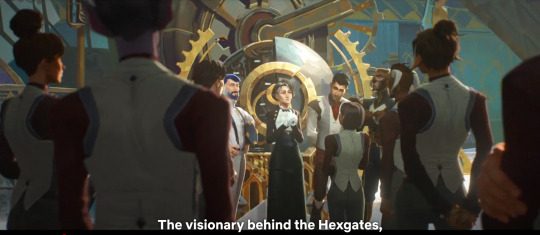
The Kiramman crest is also on the box containing the hexgems, which makes me suspect that the facility needed to process the gemstones is either owned or financed by the Kirammans.

Mel's influence is more subtle. There's no Medarda crest on anything associated with Hextech; once you learn a bit about Mel's relationship with her family, that is not surprising. But clearly Mel feels comfortable speaking to other investors on behalf of Hextech, without feeling the need to run it by Jayce or Viktor first.


I think this exchange implies that (1) getting additional, outside investors is something new that they haven't done to finance earlier rounds of Hextech development, and (2) Mel is planning ahead in case the Council doesn't like the direction Hextech is going next and they need to secure additional funding.
I wouldn't be surprised if Mel was the one who steered them toward shipping and long-distance trade as a marketable use for Hextech in the first place, something many of the councillors seem to have an economic stake in.
Throughout this whole scene with Jayce and Mel, the Hexgate model sitting on her desk is very prominent. It's the first thing we see in the scene; the color and lighting make it stand out; and it appears in the frame in multiple shots. It's the thing that's always there between them.


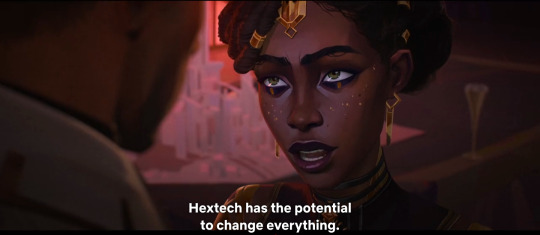

Mel and Cassandra Kiramman are also councilors, and along with Heimerdinger they are Hextech's main allies on the Council--3 out of 7. Jayce and Viktor really can't afford to piss off any of them...which gets complicated when they want opposite things.
At the time of Progress Day, Hextech is at a turning point.

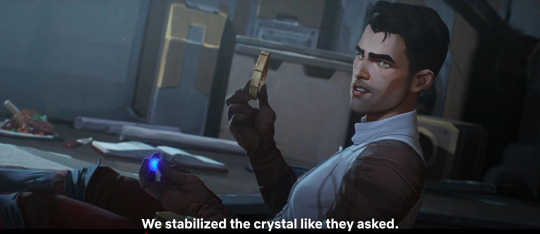
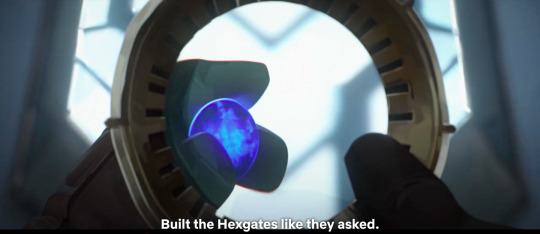
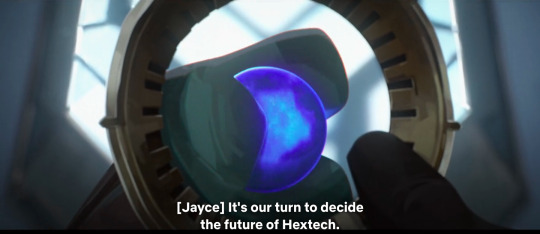
This conversation implies that they have not had a lot of freedom to develop and build whatever they wanted in the years during the timeskip. It's an interesting reversal of the dynamic we saw from them in 1.02 and 1.03. This time Jayce is the one forging ahead, confident they can get what they want, while Viktor is the one pointing out obstacles. (This is also the first time we see Viktor's face post-timeskip and register how much sicker he's become, which...oof.)
Regardless of how much they talk about "bringing magic to the people," I think it's notable that both their little spiels focus on how these inventions would increase worker productivity. This is a presentation designed for people who are thinking about their bottom line. And they seem to expect that any new developments with Hextech will have to be given Council approval before they can proceed.


(I think all of this puts the Hexcore in a slightly different light, too. It's quite possibly the first Hextech device since Jayce's original prototype that they've built without thinking about the pitch meeting. It's not a single-purpose object with an immediate, obvious use. In the beginning, it seems to recapture some of that original sense of wonder and discovery. And Viktor built it. I can see how he would be protective of his creation even before things Got Weird with it.)
And then, of course, everything goes off the rails. The gemstone gets stolen; Jayce gets pulled onto the Council. And after that point, every new Hextech object that Jayce makes is a weapon.
Jayce and Viktor's arc can be read as a story about the hubris of scientists thinking they can control forces they don't understand and anticipate every possible consequence, or a story about their naivete in thinking they could keep their research somehow above politics in a world full of conflict. And it's not not about those things. But it can also be read as a story about how discovery, creativity, and people's natural altruistic impulses get constrained by capitalism, and how often innovation is only valued if it can be made to serve war or profit.
(As for who controls the future of Hextech after the end of the show? With Viktor, Jayce, Mel and Heimerdinger all gone from Piltover...Caitlyn, probably. A detail I would love to see someone use in a fic.)
115 notes
·
View notes
Text
I try not to talk shit about boycotts even if they are the kind that historically don't do any good because I believe in harm reduction and every little bit helps, and also bcs I don't want to discourage people from taking action...but the people saying we just have to keep up the economic blackout for the rest of the foreseeable future and if you need anything just get it from "local/small businesses" clearly all live in cities and/or are not disabled.
Sometimes Walmart is legit your ONLY option for groceries in small towns, and that's because Walmart intentionally drove all the independent stores out of business. I spent a lot of my childhood in a village with a population of 200(and I've spent a lot of my life living in different small towns) and the only local restaurant was open like a handful of completely random days out of the year and when the owner died they closed. If you wanted to buy anything you're either driving to the nearest bigger town to shop at a Walmart or Food Lion or Win-Dixie or Safeway because those are your only options, or buying stuff online and hoping the shipping fees don't cost more than the product itself/that they deliver to your neck of the woods AT ALL.
And that's not even getting into how disability can complicate this. Try buying everything you need at small local businesses when you don't have a car, don't have good/any public transit, the nearest post office is in a different town, you likely aren't getting proper treatment because the only specialist who can help is a 2 hour drive away, your mobility is limited/you're in a wheelchair or use another mobility aid, and you get like less than $1k a month in gov benefits and like $200 in EBT. Most local businesses have to upcharge because they aren't Walmart and $1k a month is NOT enough to shop at them for all your needs. Barely enough to shop for one of your needs, tbh. And these people cannot just leave because that $1300 bucks goes a lot farther in the ass end of nowhere than it does in a city that could actually meet your needs. There's no winning.
(Also sorry if someone has autism or ARFID and all they can stomach is McDonalds or idk Hot Pockets and Uncrustables then I think they deserve to be left the fuck alone to eat whatever food they can. Disabled people get a pass on this, because disabled people suffering and dying is bad and society already treats us like subhuman freaks. Fun tip! If you see your disabled friend who has food texture issues eating chicken nuggets from McDonalds you can try leaving them the fuck alone about it! Hope that helps!! (Like dude I hate shopping at Whole Foods but that is the store with the biggest gluten free section. And I need to eat.)
And like the most annoying thing is that NONE of the people posting about this are suggesting like, any form of mutual aid to support people who can't currently take part for one reason or another? Which is why it doesn't fucking work. Capitalism makes you complicit, it destroys all your other options so that you have to buy from big corporations, and lobbies to ensure this is legal and also all of your non-private options for transportation and necessities are shit and get replaced by slightly better private options BUT only until they reveal they were only being "good" to destroy their competition and now are going to be even worse than the places they ran out of business.
(Also like, I love local businesses too and try to shop at them as much as I can...but they aren't always more ethical than the alternative and acting like they are is profoundly disconnected from reality. In 2016 when I lived in Flagstaff, AZ we voted to raise the state minimum wage to $10 an hour, and Flagstaff specifically voted for $15. This was needed, rent on a studio apartment in 2016 was like $1k and that was BEFORE utilities and internet. And it almost worked, only a coalition of small business owners threw such a massive fit about having to possibly pay their employees enough to survive in an insanely expensive city to live in that the city council REVERSED THE DECISION. Flagstaff is honestly a ridiculously classist city, beat only by the evil rich people paradise that is fucking Sedona(which is almost entirely local businesses, who are owned by people who voted against setting aside one parking lot at a charity for PEOPLE TO SLEEP IN THEIR CARS because you cannot live in Sedona unless you're rich, and the rich people there don't really care if the person working at the crystal shop can't afford to eat or is living out of their car.) Anyway, the poor people in Flagstaff had their say, but our say was not considered good enough, and was fucking overruled to protect the interests of rich assholes who would absolutely love to continue to be able to treat us all like shit and pay us nothing. So yeah. Small/local does NOT mean ethical. I've seen franchised fast food restaurants treat their employees better and pay them more than some small local ones do. And that's not even getting in to how a lot of local businesses are NOT accessible for people with mobility aids. Half the stores on 4th Ave are so small my wheelchair can't fit comfortably inside or have stairs at the entrance. It's always more complicated than just "buy local".)
The people who can afford to avoid stores like Walmart are probably already doing it(you couldn't pay me to go into a Walmart unless it was absolutely necessary, I fucking hate that place SO goddamn much that it legit gives me panic attacks if I'm in there for too long) and the ones who can't afford it can't afford it, and you are offering absolutely no support to help fix that. It's just "shop local! don't go to Walmart or use Amazon!! don't use your debit card!!" with no acknowledgement of those intentionally being the only options a lot of people can fucking afford or that exist at all. That's how capitalism works!! You can't fight it by refusing to accept how it controls people's lives, and pushing people to take part in a broad, directionless boycott with no consideration for the reality of living in America right now or help offered to vulnerable people who legit cannot just shop local is doomed to fail.
If you can shop local(and know the local shops aren't run by power-mad capitalists playing pretend as feudal lords and are not at all better in terms of ethical business than Walmart) and avoid Target and Walmart and McDonalds, by all means, do. If you can help your friends, family, or community members do the same then DO IT. But if your only suggestion is just "stop shopping at anywhere owned by a capitalist" then I'm sorry you have no idea how boycotts work, shouldn't be organizing one, and absolutely should not be pressuring people who cannot reasonably take part without mutual aid offering to support them for however long it goes on for to just, idk fucking starve themselves and die for the greater good.
The Montgomery Bus Boycott worked because the community came together to make sure everyone who took part had a way to get to work and school and the grocery store and the doctor's office. It's just like a strike, you need mutual aid and money to make it possible for people to do it at all, and it does need to be targeted if it's going to register as anything more than a blip on the radar. Pooling money to split a Costco membership with your roommates or neighbors or family and giving them rides there when they need it so you can all spend at a company that has stood up to Trump instead of caving, or idk vandalizing all the Teslas in uh, Minecraft, does more to take money out of the pockets of companies like Walmart and Target and Tesla than shouting at marginalized people on BlueSky about how if they don't figure out how to shop local they're complicit in the evils of capitalism and clearly don't care about building a better world.
#sorry this has been pissing me off#I've been muting people on bsky about it#y'all have no idea what life in rural america is like or what it's like to be disabled and are completely uninterested in learning#and not only does it show it's fucking embarrassing#us politics#current events
112 notes
·
View notes
Text
⠀⠀⠀⠀⠀⠀[ 𝐋𝐄𝓝𝐃 𝐘𝐎𝐔𝐑 𝓥𝐎𝐂𝐀𝐋𝐒 ] jeon soyeon


␥ (g)i-dle’s soyeon x fem!reader ␥ 784 words 🚨 SMUT, power imbalance (senior-junior), idol non-au, hair pulling, recording session, gagging on her fingers ␥ there’s always room for one to learn, and you learn a little more about you (and her) after spending three days recording a song with her.

Jeon Soyeon is an ace in the game and everyone knows that.
She captures the audience with her charismatic stage presence, wows her industry seniors with her rapping skills, and churns out more songs than she could ever utilize for her career. Some of them get gifted or sold to other artists to avoid them being locked in the archives.
That is how you were able to be connected to the idol rapstar herself. While you have chosen to remain in the shadows with your music as an underground artist, Soyeon’s discovery of you leads you to the transition of a more public career. You quickly amass a social media presence, find yourself slipping away from SoundCloud, and cementing yourself on Spotify’s million monthly listeners club along with your favorite artists.
You, too, have a way with words in your lyrics, but you could never deny the opportunity to learn more, and to be better. Being talented enough to be gifted a song from Soyeon is one thing, but actually working with her in the recording studio is another.
You’ve been seeing her in her element for over three days. While you can swiftly tune and refine your work, Soyeon takes a little more time to do so. There are minor details that she will rework, and you patiently work with her through it because this is a new perspective for you. Your production will certainly differ from a seasoned idol’s production.
But spending three long days together has made you both discover some new things about each other.
And yourselves.
It’s the middle of the night. Your heavy eyelids threaten to draw to a close, but your back is pinned up against the wall of the small recording booth. Soyeon is tucked between your legs—one of them propped over her shoulder—and her mouth is doing inexplicable things to your pussy as her slender fingers are inside you.
Your head tips back, mouth falling open with sharp pants and suppressed moans as you struggle to stay upright. The flickering red light that indicates the session being recorded doesn’t go unnoticed but you’re too out of it (or way too into it) to care. Your mind is simply polluted by the flicks of her tongue on your throbbing clit, the sharpness of her teeth when she sucks on it bringing your back to an arch.
You fist at her hair, clenching at her roots and pushing her head closer, and she greedily laps at your dripping cunt.
“Don’t be shy,” she coos, her curled fingers thrusting deeper. “Let the mic hear you loud and clear.”
“I’m trying,” you gasp.
“Try harder.”
A sudden smack on your pussy breaks your silence. You yelp as the sharp sensation persists, her hand repeatedly swatting where you’re most sensitive. Your hip bucks at each hit, your moans gradually morphing into pathetic cries, pitched yelps, and pleas for mercy.
Soyeon gets an ego boost as she watches you crumble. Your creamy wetness coats her fingers and drips down to her wrist as she fucks you. If only she had her strap on hand, she would’ve completely ravaged you into the early hours of the morning but who would really carry that around?
And who knew you would give in so quickly?
“Soyeon.. sunbae,” you pant as your thighs tremble. “So close, so close, so close..”
Her mouth promptly finds your clit and the rapid strokes of her tongue—partnered with her fingers inside you—brings you to ecstasy. She moans as the prettiest noises fall from your lips. Your exposed tits hang from the neckline of your low cut top, and she observes them jiggling as you rock your hips against her face. She gladly accepts her fate of nearly seeing the light when your thighs lock up around her head.
When you release your grip on her hair, she falls back and marvels at the lewd, disheveled sight. You’re clawing at the walls behind you, panting and catching your breath. She eyes your slick-coated thighs. Her gaze lowers a little more, and she smirks at the puddle of your cum on the floor.
“What a messy, messy girl,” she remarks as she gets back on her feet.
She approaches you, closing you off with her hand to the wall above your head, and shoves her slick-coated digits into your mouth. You didn’t expect her to do that, therefore gagging at the sudden intrusion.
“You’re gonna sound so good on this song.”
Heat rushes to your face, and warmth steadily flows to the pit of your stomach again. Looking Soyeon in the eyes almost gives you a glimpse into the future.
One that involves you being pinned down on her bed instead.
#girl group imagines#girl group smut#gidle imagines#gidle smut#soyeon imagines#soyeon smut#x fem!reader#hoping to write a little more but rn i’m only capable of drabbles 🥲
260 notes
·
View notes
Text
Adults who can't drive cars!!
Please reblog for bigger sample size!
209 notes
·
View notes